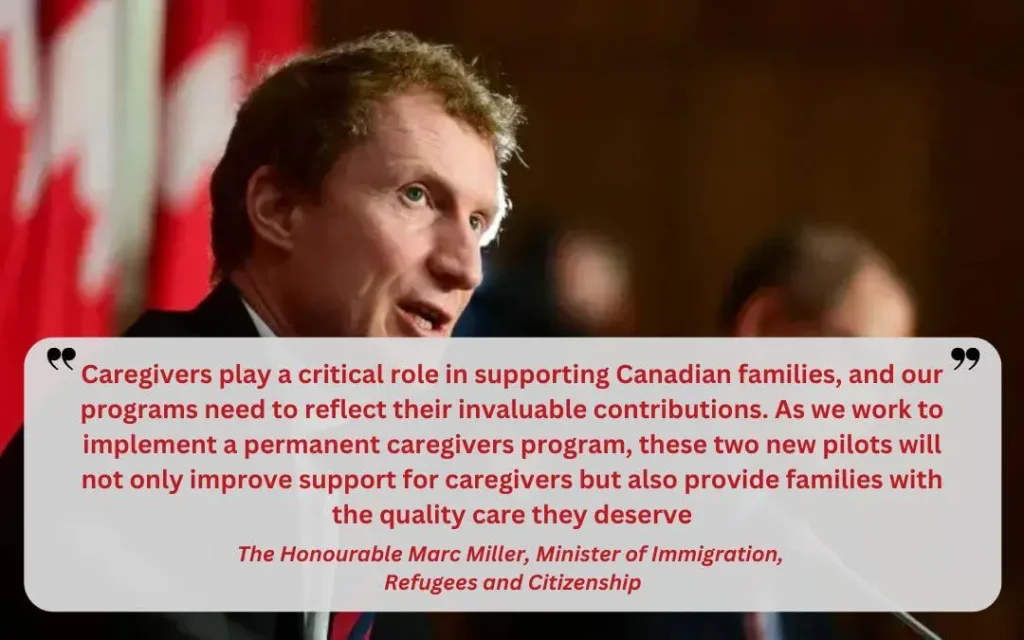Are you a Nigerian caregiver looking to migrate to Canada? There have been recent positive changes to the Caregiver Pilot Program, which is great news for caregivers who meet the requirements (more on this soon). These changes show that Canada highly values Caregivers and also reflects the government’s commitment to meeting the changing care needs of the diverse population in Canada.
The Canada Caregiver Pilot Program allows caregivers to migrate to Canada as Permanent Residents. This differs from the former caregiver program which only allowed caregivers to obtain permanent residence after working for at least 12 months.
The Home Child Care Pilot and Home Support Worker Pilot (previous caregiver programs) launched in 2019, came to an end towards the end of June 2024. As anticipated by many, the Honourable Marc Miller (Minister of IRCC) announced early in June, that a new and modified caregiver pilot program would kick off at a time that wasn’t specified.
Having helped caregivers migrate to Canada successfully over my 2 years of experience as a travel consultant, I am thrilled to provide you with updated information regarding the Caregiver Program. In this blog, you will also find information about the requirements and benefits, and other critical updates necessary to successfully leverage this route as a Caregiver from Nigeria or at least someone working towards being a Caregiver. Let’s get right into it.
Table of Contents
- Canada Caregiver Pilot Program 2024 – Requirements
- Home Child Care Pilot and Home Support Worker Pilot
- Comparing the Canada Caregiver Program 2024 with the Old Program
- Benefits of the New Caregiver Program
- New Caregiver Program Start Date
- Application Process
Canada Caregiver Pilot Program – Requirements

The requirements for the Canada Caregiver Pilot program are as follows:
- A minimum of Canadian Language Benchmark (CLB) 4: This will involve the applicant taking a language test from the following testing agencies; Canadian English Language Proficiency Index Program (CELPIP), Test d’évaluation de français (TEF Canada), Test de connaissance du français (TCF Canada), Pearson Test of English (PTE Core), and International English Language Testing System (IELTS). Most Nigerian applicants take the English Tests (IELTS and CELPIP) however, the French Language alternatives are also available to Nigerians if they wish to take the French Exams.
- Have the equivalent of a High School Diploma: As a Nigerian, you would most likely have either a WASSCE or NECO. Your results will be assessed by either World Education Services (WES) or other authorized agencies to verify that your credentials match the requirements of a high school diploma.
- Have recent and relevant work experience: This has caused some debate as many people are not entirely sure of the certifications or qualifications that will be necessary to prove relevant work experience. IRCC didn’t exactly specify what they mean specifically by “relevant work experience”, or the duration they’ll consider to be “recent” during the announcement. However, I believe that applicants will require working experience as a caregiver at a caregiving organization or a home, with proofs such as an employment letter, payslips, as well as an employment reference letter from their employer to verify that they worked at the said organization. There will be clarification on this when the program launches.
- Receive an offer for a full-time home care job: Applicants will also require a job offer from an employer in a private household, or from a care organization.
These requirements are less stringent compared to the requirements for the now-expired Home Child Care Pilot and Home Support Worker Pilot. For instance, to become a permanent resident as a caregiver previously, you were required to have at least a year of work experience. The reduction in this requirement for the imminent caregiver program is a testament to Canada’s value for Caregivers as a critical part of healthcare in Canada. It shows the intention of attracting and retaining workers in this profession to level up with the demand in the country. This is also evident in Canada’s Immigration plan to welcome more than 15,000 new permanent residents through the caregivers program between 2024 and 2026 (Source).
Caregivers play a critical role in supporting Canadian families, and our programs need to reflect their invaluable contributions. As we work to implement a permanent caregivers program, these two new pilots will not only improve support for caregivers, but also provide families with the quality care they deserve.
The Honourable Marc Miller, Minister of Immigration, Refugees and Citizenship
Home Child Care Pilot and Home Support Worker Pilot

As of April 30, 2024, nearly 5,700 caregivers had become permanent residents since the launch of the Home Child Care Pilot and Home Support Worker Pilot (IRCC). These programs required that you work in a private home. For the Home Child Care Provider (NOC 44100), caregivers had the option of choosing to care for children either in their home or the employer’s private home while in the case of the Home Support Worker Program (NOC 44101), caregivers were only allowed to work at the employer’s private home and not an institutional setting. These programs operated for 5 years, from 2019 – 2024.
The Migrant Workers Alliance for Change (MWAC) had been advocating for a change to the requirements for the caregiver program in Canada. They cited that stringent language proficiency, and education – among other requirements for the caregiver’s program – put a limit to foreign caregiver’s access to Canada. In their opinion, the requirements at the time, were not an accurate yardstick for measuring the ability of Caregivers to do well on the job. This eventually paid dividends with the recent announcement on July 3, 2024.
After hearing stories and feedback from caregivers across Canada, I am proud that we are taking concrete action to create policies to support the caregiver community. Generations of women and men have advocated for this important pathway and have cared for our families and loved ones here in Canada. Now is the time to return the care they deserve.
The Honourable Rechie Valdez, Minister of Small Business
Comparing the Canada Caregiver Pilot Program 2024 with the Old Program
As previously stated through our discourse, the imminent caregiver program differs from the old programs in some ways:
| Old Caregiver Program | Canada Caregiver Program 2024 |
| Applicants were required to work for at least one year before applying for PR | PR will be obtained upon arriving in Canada |
| Applicants were required to have at least one year of education after secondary school | Applicants only require a high school diploma, making the program more accessible |
| Applicants were required to have at least 6 months of work experience in caregiving to qualify | This is still unknown for now. The information released only stated that recent and relevant work experience is required without specification of the duration |
| Applicants were only allowed to work in either their home or the private home of their employer and not in an institutional setting | Applicants can now apply for a caregiving position in an organization providing care services, i.e. an institutional setting |
Benefits of the New Caregiver Program

Under the new caregivers program which will kick off towards the end of 2024/early 2025, caregivers can look forward to the following benefits:
- Permanent residency upon arrival in Canada. This gives new caregivers a sense of stability and security when they land in Canada.
- Flexible work options as caregivers can now work in organizations offering part-time or temporary care.
- Caregivers can include family members in their application. Additionally, if a caregiver has a family member(s) who earns well in Canada, they can hire the said caregiver to come in as long as the caregiver meets the requirements earlier mentioned.
- Canada plans to grant 15,000 caregivers PR between 2024 and 2026 (source)
New Caregiver Program Start Date
During the announcement by IRCC, the new caregiver program start date was not specified. The information in this blog was what was communicated, along with a guarantee to share more information before the full launch of the pilots.
More information will be available before the full launch of the pilots, including full eligibility criteria and details on how to apply.
IRCC
However, as I’ve indicated previously, more information is expected to come to light towards the end of 2024/early 2025.
Application Process
As of today, there is no information on the process for application for the new caregiver program. More information will be shared by IRCC in the coming months and I’ll update that here.
As I wrap this up, I strongly encourage you to start getting things in order if you would like to migrate to Canada via this route. The most critical requirement is that you get a job offer. Once this is settled, you can proceed to take the IELTS exams and educational credential assessment in preparation for an application. Also, ensure you get the necessary verifiable work experience before this program launches so you’re able to apply on time. Click here for a guide to getting a caregiving job in Canada.
Remember that you can leverage other immigration routes as well. As much as the caregiver’s route is attractive at this point, do not put all your eggs in one basket. Learn the requirements for migrating through other routes like the study route, and express entry routes. Leave any comments or questions in the comments below, and I’ll ensure they are addressed promptly. Act fast, take advantage of this route and I wish you the best.



